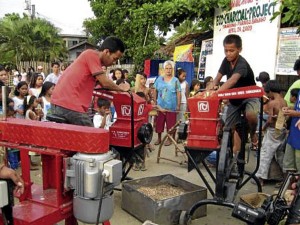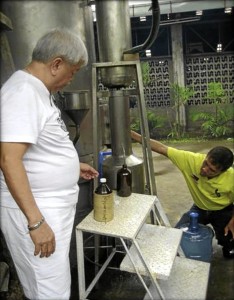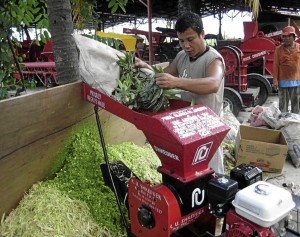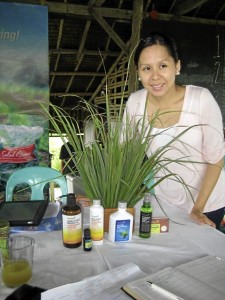By: Cris Evert B. Lato
RU Foundry’s main products are shredders for paper, plastic and other biodegradable and nonbiodegradable wastes. These shredders are mostly purchased by local government units nationwide.
BACOLOD CITY—Ruby Suiño, 43, was busy arranging vegetables and fruits in her small stall inside the Negros Organic Market on a rainy Wednesday afternoon.
Prospective customers, both foreigners and locals, were checking her produce and Ruby put on her best smile while explaining to them how bananas, potatoes and eggplants are raised without using chemical fertilizers in her village.
“There is a big movement here in Negros to produce more organic products because it is better for people’s health. Farming also continues because the soil’s natural qualities are not altered by chemicals,” she tells the Inquirer in Hiligaynon.
Selling the fruits and vegetables of their labor in a market used to be a far-fetched dream for farmer families like the Suiños, who have relied on the bulk-buying mechanism of traders for the longest time.
The traders go the village’s Thursday market and buy their produce by bulk at lower prices. These are then sold in the city markets at higher prices.
It was only in 2006 that they experienced retail selling inside the organic market, a concrete result of the first Negros Island Organic Farmers Festival.
The market is located at the back of the Negros Provincial Capitol and also houses an organic restaurant serving home-cooked vegetable and meat dishes.
RAMON Uy, president of RU Foundry & Machine Shop Corp., shows how essential oil is extracted from lemon grass. Uy showcases this technology inside May’s Organic Garden, a one-hectare property, serving as a one-stop shop for appropriate technology in organic farming. CRIS EVERT B. LATO/INQUIRER VISAYAS
The move to go organic is strong in Negros Occidental and the city of Bacolod serves as the main venue for promoting organic products, says Aladino “Nonoy” Moraca, executive director of Ecological and Agricultural Development Foundation, Inc. (EcoAgri).
Entrepreneurs have already recognized organic farming and organic products as viable business opportunities that can transform the lives of farmers in the province.
Ramon Uy, president of Bacolod-based RU Foundry & Machine Shop Corporation, is one of them.
Uy, an undergraduate mechanical engineer, says his “organic awareness” started when he produced shredders in 1999, an accidental invention after a friend asked him to repair his shredder.
ENTREPRENEURS have already recognized organic farming and organic products as viable business opportunities that can transform the lives of farmers in the province.
The shredder could not be repaired as most of its spare parts are not found in the country. He then offered to design a shredder using local parts. He was able to create the right model after a year.
He started selling them in 2001, about the same time when RA 9003 or the Ecological Solid Waste Management Act was signed into law.
He designed several shredders for papers, grass and biodegradable and nonbiodegradable wastes. Most of them are purchased by local government units which have started implementing solid waste management practices.
From the shredder, he improved his knowledge on vermi-composting. Biodegradable wastes are shredded and are placed in composting beds. The result is an organic fertilizer called vermicast.
“From there, we decided to develop appropriate technology that will encourage farmers to go organic,” shares Uy.
From RU Foundry, the family opened three subsidiaries, Puro Organic (which process organic products), Negros Occidental Design and Packaging Center and Fresh Start (sells organic products).
It also gave birth to foundation, Eco Agri in 2008 which aims to engage more farmers into organic farming through training and capacity-building.
They established May’s Organic Garden, a one-hectare property, which functions as a one-stop shop and showcases appropriate technology for organic farming.
Hydraulic ram pumps, lemon grass distiller, biogas digester and vermi-composting are featured in the park. Unintentionally, the organic garden also became a venue for weddings and birthday receptions because of its unique set up.
OUT of the lemon grass, essential oils can be extracted which later on can be developed into hand sanitizer, insect repellant and mouth wash. CRIS EVERT B. LATO/INQUIRER VISAYAS
Through EcoAgri, Uy says they have provided avenues for farmers the capacity to determine the value of their produce.
Uy says they have established a network of farmers from all over Negros who supplies them with organic products. EcoAgri conducts regular visits to these farms with the farmers themselves checking on each other.
“A person who wakes up at 4 a.m. should be rich. Without the farmers, this entire country will be hungry. The (current) price of rice is even cheap compared to the dedication, effort and the hard work put in by these farmers,” he stresses.
Palay (unhusked rice grain) normally bought at P14 per kilo by traders is bought by Puro Organic at P16 per kilo. This is sold under the brand Fresh Start.
They have also installed a lemon grass distiller in Barangay (village) Camalanda-an, Cauayan, Negros Occidental to produce essential oil.
Farmers raise lemon grass on the periphery areas of their farms typically planted with rice.
The essential oil is also sold to Fresh Start, which mixes it with other oils and are made into mosquito repellant, mouthwash and hand sanitizer among others.
“You have to show the farmers the economics of being a farmer. You have to give them their real worth. There is money in farming. Once they realize that they can earn through organic farming, and then later on they will be able to see that they can be more competitive than the traditional form,” he says.




